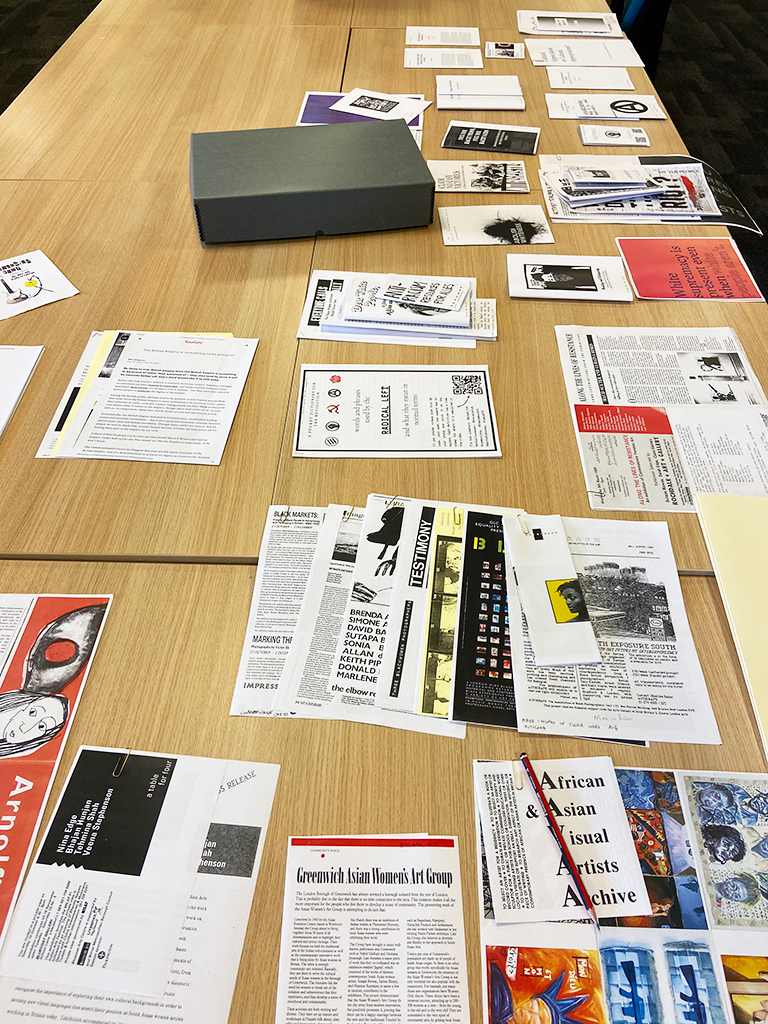
DE/RECONSTRUCTION PROJECT : Goldsmiths Special Collections & Archives, Adya Jalan, 2021
“Decolonizing is deeper than just being represented. When projects and institutions proclaim a commitment to diversity, inclusion or decoloniality we need to attend these claims with a critical eye. Decoloniality is a complex set of ideas – it requires complex process, space, money, and time, otherwise it runs the risk of becoming another buzzword, like ‘diversity’”[1] Sumaya Kassim, 2017
The De/Reconstruction Project was started in 2021 as a part of Decolonizing Projects at the Special Collections and Archives. The term ‘Decolonizing’ is often used as a buzzword, but authors like Walter Mignolo, Catherine Walsh and Ariella Azoulay provide a very comprehensive understanding of the process of decolonizing. The theories put forward by them resonate with the workings of the project. Decoloniality, a series edited by Mignolo and Walsh, consolidates a diverse range of perspectives of coloniality and decolonial thought in various histories from across the world.[2] Walsh’s understanding of decoloniality focuses on the learning and unlearning of repression, resistance, and struggle in colonial history. By discussing settler colonization in the Americas, Walsh draws attention to the local movements, struggles, resistance, and the refusal that came with it. So, primarily, decoloniality emerges as a form of struggle for survival, an epistemic response and practice by the colonized and racialized subjects, against all dimensions of colonial power.[3]On the other hand, in the book, Potential History, Ariella Azoulay offers methods and lessons to unlearn imperialism. She revaluates the history of photographs, archives, and museums by proposing that the camera’s “shutter” equates to imperialism as a whole. Plunder and systemic violence are forming the features of archives and museums, and the study of history itself – all of which serve as imperial technologies of control, conquest, and dehumanization.[4]Azoulay’s methods and reasons for unlearning imperialism explain why a pedagogical approach to decolonization is required. She writes “unlearning imperialism aims at unlearning its origins, found in the repetitive moments of the operation of imperial shutters. Unlearning imperialism refuses the stories the shutter tells.”[5]
The De/Reconstruction Project is a continuously evolving community-based archive project. It is a safe space for uncomfortable conversations, stories of struggles and marginalized histories, overlooked figures and identities. It is also a learning resource made by individual contributors on themes that resonate with them. Thus, reflecting on the above authors’ understanding, the project focusses on looking at stories of struggle and resistance, unlearning the origins of imperialism and recognizes decolonization as an ongoing struggle. How can we use archives and community-based collecting practices to unlearn imperialism and maintain an ongoing form of resistance and liberation? These are some questions this archive project aims to answer.
It is open to anyone who would like to contribute and build the collection. Contributions can involve discussions on personal stories, histories, identities etc. The collection is open to use for anyone, students, researchers, and community members alike. The possibilities to the additions in this archive are endless. Any topic, relevant to the idea of decolonization, which deserves more representation or that needs to be shared or discussed with others has a place in the De/Reconstruction Project. Another purpose of this project is to challenge the conventional way of collecting archives and transferring the power of the curator to the community, creating an opportunity for communities to speak for themselves.
The collection started as a response to Race Today (a monthly journal at the epicenter for racial justice in Britain in the 1970s) and has been built on to become a compilation of publications, zines, artist outputs, posters, and ephemera on social, political and identity related issues. Initial themes or folders include topics like radical anti-racist publications, south-Asian artists and black artists whose shows focused on racial justice, migration, and identity. Through methods like printing and creating facsimiles, material was collected from around the Special Collections and Archives from collections like the Vic Siedler Papers and Women’s Art Library, online articles, zine and webpages.
The collection method of this project is based on a community-based art project/exhibition which was organized in London around the 1980s. An arts collective based in Kings Cross, Community CopyArt, organized a photocopy-based exhibition on the theme of Black Women’s experiences of living in Britain. A range of workshops were organized with Rita Keegan and Marlene Smith to demonstrate the photocopying techniques and the possibilities of creating images through this medium. Gaining inspiration from this project, photocopying became an important medium in collecting snippets of publications, posters, pamphlets etc. Photocopying and printing can allow contributors to deconstruct collections from the archive and reconstruct them with new perspectives. This resonates with the project title but also symbolizes the deconstruction of preconceived notions about issues and communities that are reinterpreted and reconstructed by contributors. Making new and true representations is an important aspect of this project; these allow the community to emphasize their own voices. Thus, CopyArt inspired a method of De/Reconstruction of the archive to reflect a decolonizing process based on accountability and learning as identified by authors like Walsh and Azoulay.
Adya Jalan, Decolonising Projects 2021
[1] Sumaya Kassim, “The Museum Will Not Be Decolonised,” Media Diversified, 2017, https://mediadiversified.org/2017/11/15/the-museum-will-not-be-decolonised/.
[2] Walter D Mignolo and Catherine E. Walsh, On Decoloniality: Concepts, Analytics, Praxis (Duke University Press, 2018).
[3] Mignolo and Walsh, On Decoloniality: Concepts, Analytics, Praxis, 17.
[4] Stephen Sheehi, “Can We Unlearn Imperialism? Ariella Azoulay Offers Methods and Lessons,” Hyperallergic, accessed May 11, 2021, https://hyperallergic.com/583885/potential-history-review-ariella-azoulay/.
[5] Ariella Aisha Azoulay, Potential History: Unlearning Imperialism, (London: Verso, 2019), 20.
Leave a Reply